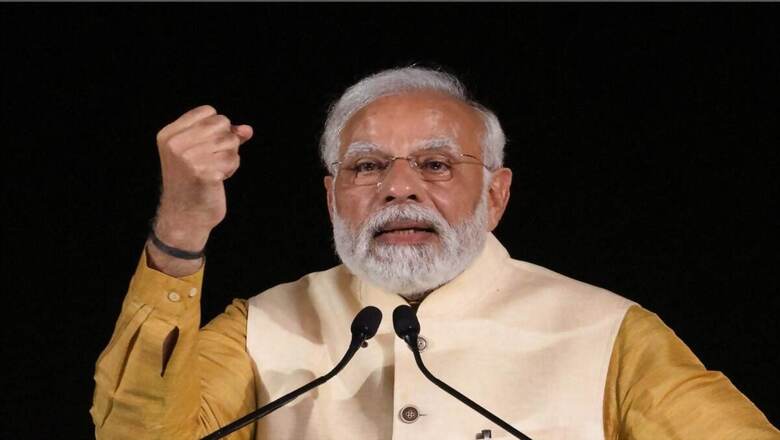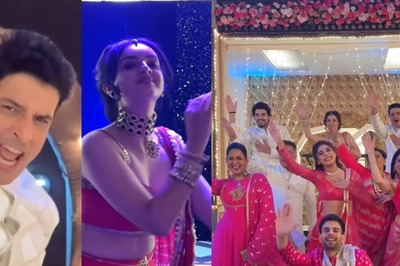
views
Prime Minister Narendra Modi on Wednesday unveiled the 6G vision document of the country and said initiatives around 6G within six months of the 5G rollout show India’s confidence.
He said from being a mere consumer of telecom technology, India is now moving fast to become a big exporter of that technology.
“Within six months of the 5G rollout, today we are talking about 6G. This shows the confidence of India. Today we have brought the vision document to the fore. This will become a big base for the rollout of 6G,” Modi said.
The vision document released by Department of Telecom states that while 5G technology promises a speed of 40-1,100 Mbps with the potential to hit maximum speed of 10,000 Mbps, 6G will offer ultra-low latency with speeds up to 1 terabit per second –which is 1,000 times more than the top speed of 5G.
The prime minister at the event inaugurated the International Telecommunication Union (ITU) Area Office and Innovation Centre , which has been set up in the Centre for Development of Telematics (C-DoT) campus. It will be fully funded by India.
He said the ITU office in India will help create the right environment for 6G in the country.
“Before 4G, India was only a user of telecom technology, but now India is moving fast to become a big exporter of telecom technology,” he said.
The prime minister said that technology that has been successfully developed indigenously is getting attention from across the world.
He said India has two main powers- “Trust and Scale”.
“Without trust and scale we cannot take technology to every nook and corner. I will say that trust is a prefix to present day technology. With 100 crore mobile phones, India is the most connected democracy of the world. Cheap smartphones and cheap data has transmogrified India,” Modi said.
He said digital inclusion has taken place at a large scale in India with digital payments, direct benefit transfer, JanDhan, Aadhaar, rapid rollout of broadband services etc.
“Telecom technology is not just a mode of power in India but it is a mission to empowerment,” Modi said.
Talking about India’s telecom success story, Modi said the number of internet users has increased from 25 crore in 2014 to 85 crore.
He said internet connections in rural areas have overtaken that of urban centres, which shows the way digital power is reaching every nook and corner of the country.
The prime minister said the government and private sector have jointly laid out 25 lakh kilometers of optical fibre in the country which includes connectivity to about 2 lakh gram panchayats.
“The effect of all this is that our digital economy is growing 2.5 times faster than the overall economy of the country,” Modi said.
He said India will set up 100 new 5G labs in the coming days.
“These labs will help in developing 5G applications as per the unique needs of India,” he said.
Modi said India is one of the countries to have rolled out 5G mobile technology at the fastest pace. He said the services have been expanded to 125 cities within 120 days of the launch of 5G.
Stressing that India’s telecom and digital model is smooth, secure, transparent and trusted, the prime minister said this decade is ‘tech-ade’.
He said the 5Gi standard developed in India is now part of the global 5G system.
“We will also work with ITU in standardisation of future technologies,” Modi said.
He announced that the World Telecommunications Standardization Assembly of ITU will be held in October next year in Delhi wherein representatives from all over the world will visit India.
“I am giving a challenge to intellectuals in this area that we do something before October that should be most relevant for the poorest of the poor country. This decade is India’s ‘tech-ade’. India’s telecom and digital model is smooth, secure and transparent and all the friendly countries of South Asia can take advantage of this,” Modi said.
ITU is the United Nations’ specialized agency for information and communication technologies (ICTs) which coordinates with all the member countries to create global standards for telecom technologies.
India was a founding member of ITU when it was formed in 1865 as the International Telegraph Union but this is the first time that ITU is opening in the South Asian region with India as the host country.
International Telegraph Union was renamed as International Telecommunication Union in 1932 and became a specialised agency of the United Nations in 1947.
India signed a Host Country Agreement in March 2022 with ITU for establishment of an area office.
The office will serve India, Nepal, Bhutan, Bangladesh, Sri Lanka, Maldives, Afghanistan and Iran, enhancing coordination among nations and fostering mutually beneficial economic cooperation in the region, a statement said.
The Bharat 6G vision document unveiled by the prime minister is prepared by Technology Innovation Group on 6G (TIG-6G) that was constituted in November 2021 with members from various ministries/departments, research and development institutions, academia, standardization bodies, telecom service providers and industry to develop a road map and action plans for 6G in India.
ITU Secretary General Doreen-Bogdan Martin said that Digital India has put the country on the forefront of technology innovation with the help of game changing initiatives like Aadhaar, UPI etc.
She said India has now much to contribute in the growing space economy as well.
The prime minister at the event also launched ‘Call before u dig’ mobile app’ that will help save damage to underground infrastructure mainly telecom fibres.
Read all the Latest India News here


















Comments
0 comment